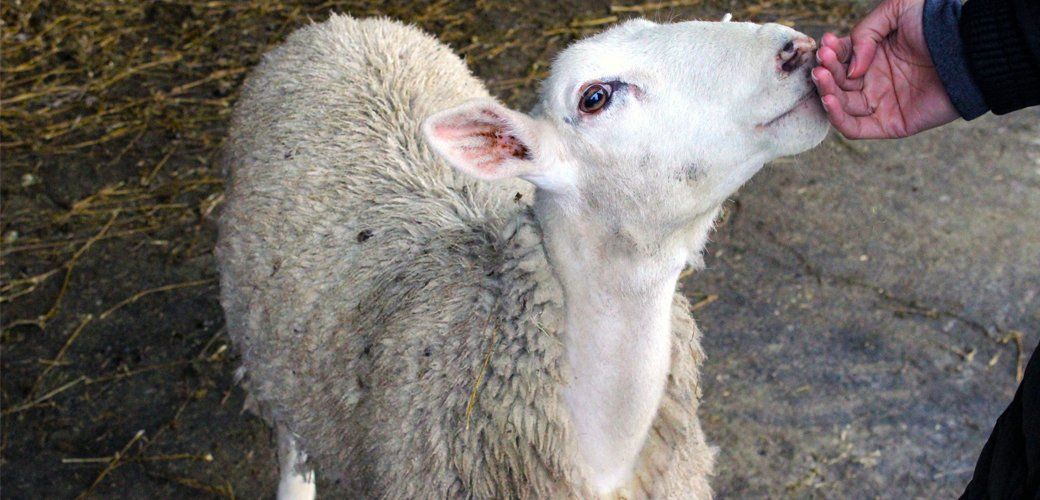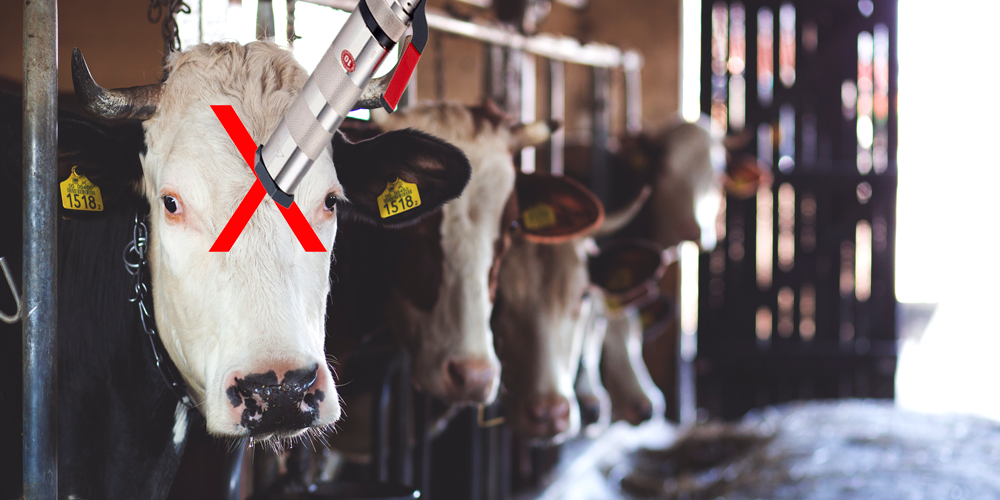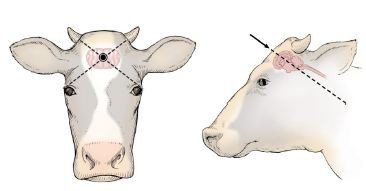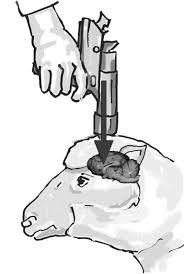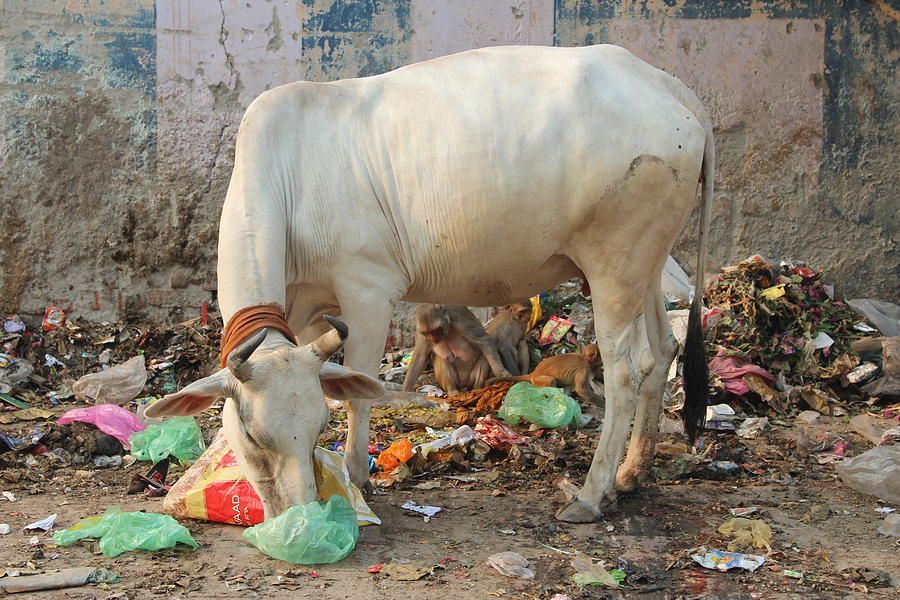1-877-HALAL-WW (+1-877-425-2599)
Animal Stunning: Halal or Haram?
Halal Means Humane: Stunning of Animals from the Islamic Perspective
In today's day and age, it is a major difficulty to know where our food comes from and more specifically, how the animals that provide meat for
us to consume are handled and managed. Many transparency laws have been implemented in order to help remove the many veils of corruption, but some of these laws do not align with the Islamic dietary code of ethics. How an animal is treated prior to slaughter is of major concern for the Muslim, as the condition pre-slaughter has certain conditions that must be upheld.
The Condition of the Animal
In Islam, the condition of the animal is discussed in detail pre-slaughter. Some animals that are considered permissible to slaughter may be rendered impermissible in certain cases. These animals are separated into two groups:
1. The‘ Iyyb (Vitiated/Defective animals)العيب-
2. The Jallaalah (Animal which feeds on filth)الجلالة -
The‘Iyyb (العيب)
The ‘iyyb are animals that are defective, sick, lame, limp, or otherwise. The classical discussion of the iyyb surrounds those animals purposed for the sacrificial slaughter during the Hajj days of tashriq. For Udhiyyah, or sacrificial slaughter, these animals are not accepted as fulfilling the conditions of a sacrificial animal, thus, cannot be slaughtered accordingly. Their meat may be consumed, so long as the dhabh process has been implemented, however, the slaughter will not be counted as ceremonial, and must be done again with an animal that properly fits the criteria.
Al-Bara bin 'Azib narrated that Allah's Messenger (ﷺ) stood among us and said , “There are four types of sacrificial animals, which are not permitted: A one-eyed animal which has obviously lost the sight of one eye, a sick animal which is obviously sick, a lame animal which obviously limps, and an old animal which has no marrow.” [1] 'Ali bin Abi Talib, may Allah be please with him, said: “The Messenger of Allah forbade sacrificing an animal with its ears slit form the front, an animal with its ears slit form the back, an animal with its ears slit lengthwise, an animal with a round hole in its ear, or an animal with its nose cut off” . [2]
For the purposes of this document, we will be linking the two concepts of the iyyb to the contemporary issue of stunning animals and how it is viewed Islamically. Here, we will discuss two main issues:
1. Is it permissible to intentionally physically harm an animal?
2. Given that an animal (not for udhiyyah) has been intentionally physically compromised, does this affect the permissibility to consume its meat?
Is it permissible to intentionally physically harm an animal?
Under normal conditions, it is not permissible (haram) for one to create this defect intentionally in the animal, as some slaughtermen do in the industry. Some harm animals out of frustration, or lack of patience.
It was narrated that Ibn 'Umar said; "I heard the Messenger of Allah say: 'May Allah curse the one who disfigures an animal. [3]
In fact, our attitude towards animals should be humane, gentle, and caring. The Companions asked the Prophet ﷺ:"Shall we be rewarded for showing kindness to the animals also?" He (ﷺ) said, "A reward is given in connection with every living creature". [4]
Our Prophet SAWS also mentioned the best and most civilized form of slaughter. Shaddad bin Aus (RAA) narrated that the Messenger of Allah (ﷺ) said: "Verily, Allah has prescribed proficiency in all things. Thus, if you kill, kill in the least painful manner you can; and when you slaughter an animal, do it in the best possible way; and any of you should sharpen his blade so that the animal may be spared from the suffering of the slaughtering." [5]
Many slaughterhouses around the world implement stunning methods that create an iyyb (defect) in the animal. Some are more severe than others. Some methods reversible, allowing for the animal to recover to normal health given a short period of time (Gas stunning, Electric Stunning) Other methods are irreversible (Captive Bolt, Bludgeon, Blunt Trauma), and cause the animal to die in a short period of time. Here, we will highlight those that are most severe and concerning and discuss them more at length. The following stunning methods fall under this category:
Penetrating Captive Bolt
A captive-bolt stunning device administers a lethal blow to the animal’s head of sufficient force to breach its skull and enter the brain.
Free Projectiles – (Bullets or other)
A free projectile penetrates the animals body.
These methods of sedation, in normal situations, are not permissible to employ, as they create undue, and unnecessary harm to the animal pre-slaughter. Captive bolt stunning also brings into the fray a heightened concern for the status of the animals life at the time of slaughter, if a proper slaughter is even being performed. If the animal is not alive at the time of slaughter due to the stunning, it’s yield becomes impermissible to consume, as it does not fulfill all of the necessary conditions.
Given that an animal (not for udhiyyah) has been intentionally physically compromised, does this affect the permissibility to consume its meat?
The answer to this question is determined via three considerations.
1. Was the animal capable of being properly slaughtered after the method of sedation was employed?
2. What is the cause of death?
If the animal is capable of being properly slaughtered, and was caused to die due to the stunning itself, then it is certainly not permissible to consume. If however, the animal was not capable of being properly slaughtered after stunning had been administered, and was caused to die via the stunning, then it is permissible to consume.
Narrated Rafi` bin Khadij; He said, "O Allah's Messenger ( ﷺ )! We have no knife." The Prophet (ﷺ) said, "if the killing tool causes blood to gush out, and if Allah's Name is mentioned, eat(of the slaughtered animal). But do not slaughter with a nail or a tooth, for the nail is the knife of Ethiopians and a tooth is a bone." Suddenly a camel ran away and it was stopped (with an arrow). The Prophet (ﷺ) then said, "Of these camels there are some which are as wild as wild beasts; so if one of them runs away from you and you cannot catch it , treat it in this manner (i.e. shoot it with an arrow) [6] .
This hadith demonstrates the conditions for the رخصة (Concession) permitting a special form of killing different to that of the general form of dhabh (slaughter). Here, the Prophet explains the concession which grants the permission to kill an animal in a way that is unconventional, and still be considered a means of slaughter. If the animal were to become wild and beast-like, and one is unable to bring the animal under control for the slaughter, then it would be permissible to kill the animal in an unconventional way. Thus, the conditions for this case are twofold:
1. The animal must be considered wild, or behave in a wild manner
2. The animal can no longer be restrained
If the conditions are fulfilled, and the animal dies due to the unconventional method, the animal will still be considered Halal to consume. Thus, Animals that are, or become wild may be killed by any means, so long as those means do not become unnecessarily excessive (e.g., mutilating the animal).
Adding to this, the Prophet (ﷺ) also said: “If the game goes out of sight for a day and you find it without any marks except for that arrow, eat if you wish, but if you find it drowned in water do not eat it." [7]
This hadith demonstrates that the Prophet permitted the consumption of meat that had not been killed according to the standard dhabh method when the animal was not able to be properly slaughtered prior to it being shot.
This position is also seconded by the great Imam Malik himself.
Imam Malik said, "The best of what I have heard about retrieving game from the falcon's talons or from the dog's fangs and then waiting until it dies, is that it is not halal to eat it. The same applies to anything which could have been slaughtered by the hunter when it was in the talons of the falcon or the fangs of the dog. If the hunter leaves it until the falcon or dog has killed it, it is not halal to eat it either. The same thing applies to any game hit by a hunter and caught while still alive, which he neglects to slaughter before it dies."
To be perfectly clear, according to the text cited, it must be stated again that if the slaughter house performs an irreversible stunning procedure(captive bolt/free projectile) upon the animal, and is able to slaughter the animal in due time, and does so, then the meat of the animal will still be considered as permissible to consume. Allah SWT has mentioned in the Qur’an, in surah 5, verse 3, "...Unless ye are able to slaughter it (in due form)…" referring to the animal that has been harmed in a way that will causes it to die in a short time. This animal is still permissible to slaughter and consume, so long as it is still alive at the time of slaughter. The intentionality of the defect is of no consequence. Meat yielding from the slaughter may still be consumed so long as the proper method of slaughter had been implemented prior to death.
Animals Slaughtered in the US
Non-religious slaughter practiced in the US by major corporations is, likewise, generally not permissible to consume, unless an able bodied individual or agency has viewed the process and concluded that it does fulfill all of the necessary conditions of Halal. It is enough to know that according to FDA regulations, there is no requirement for animals to be alive, nor do they require the animal to have their necks cut at all. This gives cause for concern to any conscious Muslim consumer. If the government does not require companies to follow the Islamic prescription, then we must assume, as evidence indicates, that it is not being followed.
§1902. Humane methods
No method of slaughtering or handling in connection with slaughtering shall be deemed to comply with the public policy of the United States unless it is humane. Either of the following two methods of slaughtering and handling are hereby found to be humane:
(a) in the case of cattle, calves, horses, mules, sheep, swine, and other livestock, all animals are rendered insensible to pain by a single blow or gunshot or an electrical, chemical or other means that is rapid and effective, before being shackled, hoisted, thrown, cast, or cut; or
(b) by slaughtering in accordance with the ritual requirements of the Jewish faith or any other religious faith that prescribes a method of slaughter whereby the animal suffers loss of consciousness by anemia of the brain caused by the simultaneous and instantaneous severance of the carotid arteries with a sharp instrument and handling in connection with such slaughtering. (HUMANE METHODS OF LIVESTOCK SLAUGHTER, 1958)
Ever since the “Slaughter of Animals Act 1933” was passed in the United States of America, cattle and other such animals that are not slaughtered according to religious law fall under the mandate of secular humane laws. These animals are required to be stunned prior to slaughter. The most prevalent method of stunning being captive bolt stunning. The stunner uses a pointed bolt propelled by pressurized air to penetrate the skull of the animal, enter its cranium, and catastrophically damage the brain. The animal becomes limp, unresponsive, and concussed. This method physically destroys brain matter, which can sometimes cause brain tissue to enter the blood stream. If it does, other tissue can become contaminated via bovine spongiform encephalopathy (BSE, colloquially known as mad cow disease) (Captive bolt pistol, n.d.).
Permission cannot be granted to our Muslim brethren to consume any foods being processed outside of Halal or strict orthodox Jewish regulators that adhere to these rules.
The Jallaalah (الجلالة)
It was narrated that Ibn ‘Umar said: “The Messenger of Allah ( ﷺ ) forbade the meat and milk of Al-Jallaalah.” [8] Abu Dawud said: Jallalah means an animal which eats filth and impurities. [9] The animal discussed in this hadith is called Al-Jallaalah , or an animal that consumes filth in excess of 50% of its diet. It is not permissible to consume its meat, as all of its corporeal becomes filthy (najas) through the consumption of filth. This animal must be fed on a pure diet for a number of days stipulated in Islamic law that will allow it to become pure again for slaughter and consumption.
In summary of the above categories of animals, the animal for slaughter must be on a
tayyib (clean) feed diet, and must be free of debilitating defects and missing or maimed body parts. The defect must not have been intentionally caused.
[1] وَعَنِ اَلْبَرَاءِ بنِ عَازِبٍ رَضِيَ اَللَّهُ عَنْهُمَا قَالَ: قَامَ فِينَا رَسُولُ اَللَّهِ - صلى الله عليه وسلم -فَقَالَ: { "أَرْبَعٌ لَا تَجُوزُ فِي اَلضَّحَايَا: اَلْعَوْرَاءُ اَلْبَيِّنُ عَوَرُهَا, وَالْمَرِيضَةُ اَلْبَيِّنُ مَرَضُهَا, وَالْعَرْجَاءُ اَلْبَيِّنُ ظَلْعُهَ ا (1769) وَالْكَسِيرَةُ اَلَّتِي لَا تُنْقِي" } رَوَاهُ اَلْخَمْسَة ُ (1770) . وَصَحَّحَهُ اَلتِّرْمِذِيُّ, وَابْنُ حِبَّان َ (1771) .
1 - كذا "بالأصل" وهو الموافق لرواية السنن، وفي النسخة: "أ" : "عرجها" وأشار الناسخ في الهامش إلى نسخة "ضلعها".
2 - كذا "بالأصلين" وأشار ناسخ "أ" في الهامش إلى نسخة: "أحمد والأربعة".
3 - صحيح. رواه أبو داود ( 2802 )، والنسائي ( 7 / 214 - 215 )، والترمذي ( 1497 )، وابن ماجه ( 3144 )، وأحمد ( 4 / 84، 289 )، وابن حبان ( 1046 ). وقال الترمذي "حديث حسن صحيح". - At-Tirmidhi and Ibn Hibban graded it as Sahih. - English reference: Book 12, Hadith 1391
[2] أَخْبَرَنَا أَحْمَدُ بْنُ نَاصِحٍ، قَالَ حَدَّثَنَا أَبُو بَكْرِ بْنُ عَيَّاشٍ، عَنْ أَبِي إِسْحَاقَ، عَنْ شُرَيْحِ بْنِ النُّعْمَانِ، عَنْ عَلِيِّ بْنِ أَبِي طَالِبٍ، رضى الله عنه قَالَ نَهَى رَسُولُ اللَّهِ صلى الله عليه وسلم أَنْ نُضَحِّيَ بِمُقَابَلَةٍ أَوْ مُدَابَرَةٍ أَوْ شَرْقَاءَ أَوْ خَرْقَاءَ أَوْ جَدْعَاءَ . - Grade: Hasan - Reference: Sunan an-Nasa'i 4374
[3] (Sahih )أَخْبَرَنَا عَمْرُو بْنُ عَلِيٍّ، قَالَ حَدَّثَنَا يَحْيَى، قَالَ حَدَّثَنَا شُعْبَةُ، قَالَ حَدَّثَنِي الْمِنْهَالُ بْنُ عَمْرٍو، عَنْ سَعِيدِ بْنِ جُبَيْرٍ، عَنِ ابْنِ عُمَرَ، قَالَ سَمِعْتُ رَسُولَ اللَّهِ صلى الله عليه وسلم يَقُولُ " لَعَنَ اللَّهُ مَنْ مَثَّلَ بِالْحَيَوَانِ " . Reference : Sunan an-Nasa'i 4442
[4] حَدَّثَنَا قُتَيْبَةُ بْنُ سَعِيدٍ، عَنْ مَالِكِ بْنِ أَنَسٍ، فِيمَا قُرِئَ عَلَيْهِ عَنْ سُمَىٍّ، مَوْلَى أَبِي بَكْرٍ عَنْ أَبِي صَالِحٍ السَّمَّانِ، عَنْ أَبِي هُرَيْرَةَ، أَنَّ رَسُولَ اللَّهِ صلى الله عليه وسلم قَالَ " بَيْنَمَا رَجُلٌ يَمْشِي بِطَرِيقٍ اشْتَدَّ عَلَيْهِ الْعَطَشُ فَوَجَدَ بِئْرًا فَنَزَلَ فِيهَا فَشَرِبَ ثُمَّ خَرَجَ فَإِذَا كَلْبٌ يَلْهَثُ يَأْكُلُ الثَّرَى مِنَ الْعَطَشِ فَقَالَ الرَّجُلُ لَقَدْ بَلَغَ هَذَا الْكَلْبَ مِنَ الْعَطَشِ مِثْلُ الَّذِي كَانَ بَلَغَ مِنِّي . فَنَزَلَ الْبِئْرَ فَمَلأَ خُفَّهُ مَاءً ثُمَّ أَمْسَكَهُ بِفِيهِ حَتَّى رَقِيَ فَسَقَى الْكَلْبَ فَشَكَرَ اللَّهُ لَهُ فَغَفَرَ لَهُ " . قَالُوا يَا رَسُولَ اللَّهِ وَإِنَّ لَنَا فِي هَذِهِ الْبَهَائِمِ لأَجْرًا فَقَالَ " فِي كُلِّ كَبِدٍ رَطْبَةٍ أَجْرٌ " .
Reference : Sahih Muslim 2244
[5] وَعَنْ شَدَّادِ بْنِ أَوْسٍ - رضى الله عنه - قَالَ: قَالَ رَسُولُ اَللَّهِ - صلى الله عليه وسلم -{ " إِنَّ اَللَّهَ كَتَبَ اَلْإِحْسَانَ عَلَى كُلِّ شَيْءٍ, فَإِذَا قَتَلْتُمْ فَأَحْسِنُوا اَلْقِتْلَةَ, وَإِذَا ذَبَحْتُمْ فَأَحْسِنُوا اَلذِّبْحَةَ, وَلْيُحِدَّ أَحَدُكُمْ شَفْرَتَهُ, وَلْيُرِحْ (1756) ذَبِيحَتَهُ" } رَوَاهُ مُسْلِمٌ (1757) . English reference : Bulugh Al Maram - Kitab al At’ama - Book 12, Hadith 1382
[6] حَدَّثَنَا عَبْدَانُ، قَالَ أَخْبَرَنِي أَبِي، عَنْ شُعْبَةَ، عَنْ سَعِيدِ بْنِ مَسْرُوقٍ، عَنْ عَبَايَةَ بْنِ رَافِعٍ، عَنْ جَدِّهِ، أَنَّهُ قَالَ يَا رَسُولَ اللَّهِ لَيْسَ لَنَا مُدًى. فَقَالَ " مَا أَنْهَرَ الدَّمَ وَذُكِرَ اسْمُ اللَّهِ فَكُلْ، لَيْسَ الظُّفُرَ وَالسِّنَّ، أَمَّا الظُّفُرُ فَمُدَى الْحَبَشَةِ، وَأَمَّا السِّنُّ فَعَظْمٌ ". وَنَدَّ بَعِيرٌ فَحَبَسَهُ فَقَالَ " إِنَّ لِهَذِهِ الإِبِلِ أَوَابِدَ كَأَوَابِدِ الْوَحْشِ فَمَا غَلَبَكُمْ مِنْهَا فَاصْنَعُوا هَكَذَا ".
Reference : Sahih al-Bukhari 5503
[7] Bulugh Al Maram - Kitab al At’ama - English reference - Book 12, Hadith 1373
[8] حَدَّثَنَا سُوَيْدُ بْنُ سَعِيدٍ، حَدَّثَنَا ابْنُ أَبِي زَائِدَةَ، عَنْ مُحَمَّدِ بْنِ إِسْحَاقَ، عَنِ ابْنِ أَبِي نَجِيحٍ، عَنْ مُجَاهِدٍ، عَنِ ابْنِ عُمَرَ، قَالَ نَهَى رَسُولُ اللَّهِ ـ صلى الله عليه وسلم ـ عَنْ لُحُومِ الْجَلاَّلَةِ وَأَلْبَانِهَا . - Grade: Hasan - English reference: Vol. 4, Book 27, Hadith 3189
[9] قَالَ أَبُو دَاوُدَ الْجَلاَّلَةُ الَّتِي تَأْكُلُ الْعَذِرَةَ . - Grade: Sahih - Reference: Sunan Abi Dawud 3719



